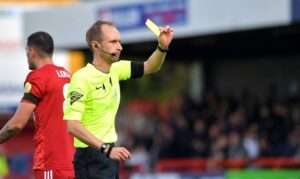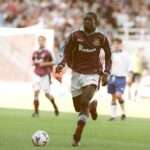A
Abandonment
When the referee calls off a match in the middle of play. Severe weather conditions or crowd disturbance are common reasons for a match to be abandoned. It will be played in full at a later date.
Also Known As: Called off
Added Time
The time added on by the referee at the end of each 45 minute half to compensate for interruptions during the game. Injury time is commonly added on for substitutions (30 seconds for each one), injuries, time wasting and other interruptions.
Also Known As: Injury time, Time added on.
Advantage Rule
When the referee chooses to allow play to continue if an offense has been made against the team in possession of the ball, he enforces the advantage rule. He does this if the attacking team would be unnecessarily penalized if play were to be stopped. The clause in the rules is supposed to improve the flow of the game and benefit attacking teams who have had an offense committed against them but it is in their best interests to play on rather than win a free-kick.
Also Known As: Play-on
Against the Run of Play
When one team scores a goal after being on the back foot and defending for long periods.
Examples: Team A scored “against the run of play” after withstanding a barrage of attacks from Team B.
All
A term used to signify a draw. If team A and team B have each scored one goal in a game, it is said to be tied at ‘one-all’.
Also Known As: All square
All-seater
A stadium is all-seater if it has a seat for every spectator. All-seater stadiums are considered to be safer than those where supporters are allowed to stand while watching the game. There have been several occurrences of fans being crushed in non all-seater stadia.
All-ticket
If a match is ‘all-ticket’, it means that supporters are unable to buy a ticket on the day. Supporters must purchase tickets in advance. This is a measure taken to avoid crowd trouble on the day of a game.
Amateur
Not professional. Amateur teams and players generally play in the lower leagues, with the higher divisions consisting of full-time professionals.
Anchorman
An anchorman’s primary role is to break up the opposition’s attacks. Anchormen help protect a team’s back line by sitting in front of the central defenders and do not contribute as much to attacking plays. An ability to tackle is a key attribute. Most good teams have a player capable of screening the defense, acting as an insurance policy should the team surrender possession.
Also Known As: Defensive midfielder, Holding midfielder, Midfield anchor.
Appearance
A player who plays in a match for any length of time is said to have made an ‘appearance’.
Association Football
This is the sport’s original name and used to distinguish it from other forms of football, specifically ‘rugby football’. The Football Association formalized the laws of the game, hence the first part of the name.
Artificial Surface
Some teams, particularly in colder countries player on artificial surfaces because they are easier to maintain in the winter. Artificial turf is manufactured from synthetic fibres made to look like natural grass.
Also Known As: Synthetic surface, Astroturf, Plastic pitch
Assist
The pass or passes which immediately precede a goal; a maximum of two assists can be credited for one goal.
Also Known As: Set-up
Example: A winger crosses the ball into the penalty area and the striker scores with his head or foot. The assist belongs to the winger.
Assistant Referee
In professional soccer there are two assistant referees whose job it is to call offsides, throw-ins and help the referee make decisions. Carrying a flag to signal their observations, linesmen must monitor the sidelines and goal lines and flag if the ball goes out of play, signalling which team the goal kick or throw-in should be awarded to.
A key aspect of their job is deciding whether a ball has crossed the goal line between the posts when the call is marginal.
Also Known As: Linesman.
Astro Turf
An artificial surface used instead of grass on football fields.
Also Known As: Synthetic Surface
Attacker
An attacker is a player with intent to go forward and help create or score goals.
Attacking Midfielder
Definition: The most advanced of a team’s midfielders. Attacking midfielders go forward at regular intervals to join the team’s strikers to support them with passes, assists or shots at goal.
Also Known As: Playmaker.
Attacking Team
The team with possession of the ball and intent to go forward.
Attacking Third
The third of the field where one team is trying to score against the opposing team.
Also Known As: Final Third
Attendance
The number of people inside a soccer stadium.
Also Known As: Gate, Crowd
Away
If a team is playing in the opponents’ stadium, they are away. Traditionally it is harder to play away than at home, because the opposition have more fans supporting them, do not have to travel and are familiar with the confines of their own stadium.
Away Goals Rule
This is a method of separating teams in cup competitions which are played over two legs. If teams have scored the game number of goals against eachother over two matches, goals scored in the opposition’s stadium (away goals) count double at the end of the second match. If team ‘A’ has drawn 2-2 with team B in their own stadium, but 3-3 in team ‘B’s’ stadium, team A would progress on the away goals rule.




